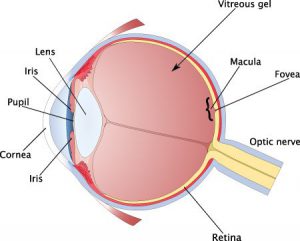Poor Vision
If you have poor vision in your disability case before the  Social Security Administration, you will need a thorough vision test that measures not only your visual acuity (distance), but also your peripheral vision (visual fields). A complete ophthalmology exam will include a report on how well you can see at certain distances and also from side to side. If you can see to read normal size print and you are able to drive regularly, you probably do not have a serious visual limitation. However, blindness is not an all or nothing thing – people who are statutorily blind are able to get about without a white cane or seeing-eye dog. But even if you can move about and you are statutorily blind, you are going to be limited in what you can do during the day. These limitations during the day will be at the heart of your Social Security disability hearing.
Social Security Administration, you will need a thorough vision test that measures not only your visual acuity (distance), but also your peripheral vision (visual fields). A complete ophthalmology exam will include a report on how well you can see at certain distances and also from side to side. If you can see to read normal size print and you are able to drive regularly, you probably do not have a serious visual limitation. However, blindness is not an all or nothing thing – people who are statutorily blind are able to get about without a white cane or seeing-eye dog. But even if you can move about and you are statutorily blind, you are going to be limited in what you can do during the day. These limitations during the day will be at the heart of your Social Security disability hearing.
Most people with severe visual problems that are trying to obtain Social Security disability suffer from diabetes or glaucoma , or both. These medical conditions can cause a loss of field of vision as well as a loss of visual acuity. No matter what your main medical problem, if it involves your vision, the total picture of your health, including your eyes needs to be presented to the Social Security Administration.
Common Vision Tests
| Visual acuity tests | Measures the ability to see details at near and far distances |
| Refraction | Measures the eyes’ need for glasses |
| Visual field tests | Measures gaps in your side (peripheral) vision |
| Color vision tests | Measures ability to distinguish colors |
Your vision impacts your work. If you are having problems reading print or computer screens you would have a problem following directions if given in this manner. If you have a  problem with your peripheral vision, this could interfere with your ability to see oncoming dangers such as cars or carts. You may even have a problem with seeing the difference between two floors that are at different heights which could cause you to fall. All these issues really do matter and if your vision cannot be corrected to overcome such problems, you will have a problem working. The Social Security Administration needs to know about the details of your uncorrected visual problems.
problem with your peripheral vision, this could interfere with your ability to see oncoming dangers such as cars or carts. You may even have a problem with seeing the difference between two floors that are at different heights which could cause you to fall. All these issues really do matter and if your vision cannot be corrected to overcome such problems, you will have a problem working. The Social Security Administration needs to know about the details of your uncorrected visual problems.
What Our Clients Say:
Member:

Attorney Gregory Kornegay
Greg is a trial attorney in Wilmington with over 30 years of experience. Greg was born and raised in southeastern North Carolina. Before law school he managed a store with employees making a payroll every week. His first job out of law school was as an Assistant District Attorney investigating and trying cases for the State of North Carolina. Through the years he has handled many different types of cases – including death penalty cases.
Being married with children has been a blessing and a challenge, but has served him well in understanding the problems individuals and families face as they live out their lives. Greg believes that each case is different and the needs of each client are unique, but there are certain themes of life that we all share.


